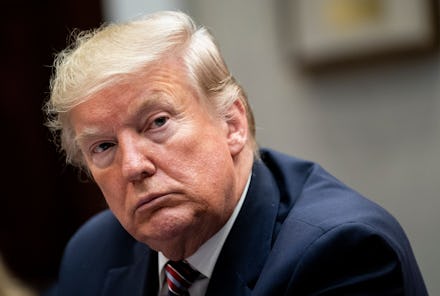Majority of Americans feel "less safe" after Trump's killing of Soleimani

Following the murder of Iranian Gen. Qassem Soleimani, President Trump seemed to expect a heap of praise. However, a new poll reveals that the majority of Americans disapprove of Trump's actions regarding Iran. With tensions simmering between the United States and Iran, Trump's behavior appears to have made many people feel less safe.
Since Soleimani's death, the Trump administration has released vague and often contradictory reasoning for the airstrike. Trump himself clings onto the line that Soleimani was planning "imminent and sinister attacks," but there is no substantial evidence to support that claim.
Rather than making Americans feel safer with the strike, Trump has managed to do the complete opposite. A poll conducted by Ipsos for ABC News found that 56% of Americans disapprove of Trump's handling of the situation. In addition, 52% say that they felt less safe after the drone strike.
With the potential of the U.S. entering a new war looming, other politicians are speaking out against it. Notably, Rep. Ilhan Omar (D-Minn.) opened up about her experiences with PTSD and highlighted that Iranian civilians will face the harshest consequences of any potential war.
"The trauma of war is not only felt by soldiers in the battlefield, it is felt by the children as bombs go off outside their windows," Omar said in a video she tweeted. "Engaging in armed conflict never creates real stability."
The potential of yet another war in the Middle East is not an unforeseen consequence of the administration's actions. It was obvious that the U.S. killing Soleimani would force Iran to respond. Despite this fact, Trump seemed almost cavalier in the first few days after the airstrike.
As other struggled to understand the killing, Trump went to play golf the next morning, despite being advised that it could send the wrong message. Then, his re-election campaign ran Facebook ads and sent emails looking to profit off Soleimani's death.
Dissent is building not only in the United States but Iran, too. Over the weekend, people took to the streets after the government admitted it accidentally downed a Ukrainian commercial plane, killing dozens of its own citizens, in the confusing aftermath of the Soleimani assassination.
In response to reports of police firing bullets and tear gas, Trump tweeted, "DO NOT KILL YOUR PROTESTERS." He went on to warn Iranian leaders that the "USA is watching" and to "stop the killing of your great Iranian people!"
It's important to note that Iranians can protest their own government, but that does not immediately justify the United States taking military action. Often, the U.S. claims it wants to assist people in the Middle East, but American decisions can be linked to multiple destabilization efforts in Iran alone.
Besides, if Trump was concerned with Iranian civilians, he would not have threatened to commit war crimes by bombing cultural sites nor would he have brought the fear of war to the highest it'd been in years. Even as Trump warns Iran not to kill protesters, the United States is responsible for many civilian deaths in neighboring countries. Since the War on Terror began, at least 244,000 civilians have been killed in Afghanistan, Pakistan, and Iraq.
There are clear party divides between who does or doesn't support Trump's actions. According to the Ispos poll, 89% of Republicans approve, while 90% of Democrats do not. So even if the majority of Americans are currently in disapproval, it isn't a sign that the conflict will end. With an election year looming, Trump is more motivated than ever to appease his own party.